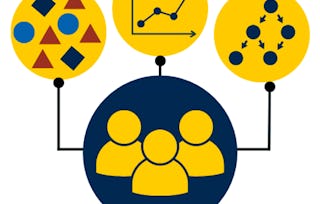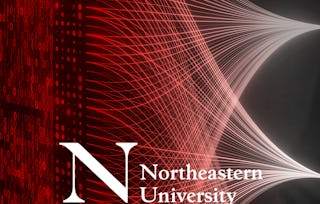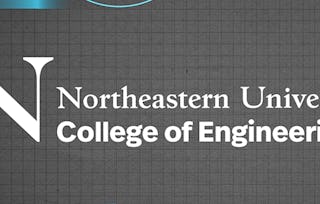Internet of things (IoT) has become a significant component of urban life, giving rise to “smart cities.” These smart cities aim to transform present-day urban conglomerates into citizen-friendly and environmentally sustainable living spaces. The digital infrastructure of smart cities generates a huge amount of data that could help us better understand operations and other significant aspects of city life.
Gain next-level skills with Coursera Plus for $199 (regularly $399). Save now.

Recommended experience
What you'll learn
Describe types of smart city-generated datasets, data mining techniques, and how to implement them using Python 3.
Explain how to read and preprocess data for data mining.
Apply data mining techniques to smart city-generated data and visualize and interpret the physical implications of the results.
Skills you'll gain
- Deep Learning
- Exploratory Data Analysis
- Statistical Programming
- Data Preprocessing
- Regression Analysis
- Data Cleansing
- Data-Driven Decision-Making
- Artificial Neural Networks
- Anomaly Detection
- Python Programming
- Machine Learning Algorithms
- Data Mining
- Data Visualization
- Classification Algorithms
- Unsupervised Learning
- Applied Machine Learning
- Big Data
- Supervised Learning
Details to know

Add to your LinkedIn profile
12 assignments
See how employees at top companies are mastering in-demand skills

There are 8 modules in this course
This module provides an overview of the course content and structure. In this module, you will learn about the different course elements. In this module, you will get acquainted with your instructor and get an opportunity to introduce yourself and interact with your peers.
What's included
2 videos1 reading1 discussion prompt
In this module, you will learn about data mining, why we need it, and the approach. The module also presents the basics of probability and statistics, which form the foundation for data mining. You will also gain insight into data preprocessing and data mining task identification.
What's included
12 videos4 readings2 assignments1 discussion prompt
In this module, you will learn about Python programming for data mining. The module also discusses important Python modules: NumPy , SciPy, and Matplotlib. You will learn to install Python using Anaconda and use the Jupyter notebook to write your code. The module also presents some examples demonstrating data preprocessing using Python.
What's included
6 videos4 readings2 assignments3 ungraded labs
In this module, you will learn about supervised learning (learning from examples). The module discusses two supervised learning tasks: regression and classification. You will also gain insights into several classification algorithms such as Bayesian classifiers, decision trees, support vector machines (SVM), and ensemble classifiers.
What's included
12 videos5 readings2 assignments1 discussion prompt9 ungraded labs
In this module, you will learn about unsupervised learning (learning from unlabelled data without any ground truth labels). The module also discusses frequent itemset mining. You will also gain an insight into several data clustering algorithms such as distribution-based, partitional, and hierarchical clustering.
What's included
11 videos5 readings2 assignments1 discussion prompt7 ungraded labs
In this module, you will learn about anomaly detection problems and algorithms. You will gain insight into anomaly detection techniques. You will learn to validate your results. When applying data mining to smart city data, you will also learn to avoid false discoveries using statistical significance testing and hypothesis testing.
What's included
5 videos2 readings2 assignments4 ungraded labs
In this module, you will learn about some advanced data mining algorithms such as artificial neural networks (ANN) and deep learning. You will develop an understanding of the applications of these algorithms. The module also analyzes hidden Markov models (HMMs) for modeling time series (sequential) data.
What's included
10 videos3 readings1 assignment1 discussion prompt4 ungraded labs
In this module, you are provided with your term-end project, instructions to complete the project, and the criteria for how your instructor will grade your submission.
What's included
1 video2 readings1 assignment1 ungraded lab1 plugin
Instructor

Offered by
Explore more from Data Analysis
 Status: Free Trial
Status: Free TrialUniversity of Michigan
 Status: Preview
Status: PreviewNortheastern University
 Status: Preview
Status: PreviewNortheastern University
 Status: Preview
Status: PreviewNortheastern University
Why people choose Coursera for their career




Frequently asked questions
To access the course materials, assignments and to earn a Certificate, you will need to purchase the Certificate experience when you enroll in a course. You can try a Free Trial instead, or apply for Financial Aid. The course may offer 'Full Course, No Certificate' instead. This option lets you see all course materials, submit required assessments, and get a final grade. This also means that you will not be able to purchase a Certificate experience.
When you purchase a Certificate you get access to all course materials, including graded assignments. Upon completing the course, your electronic Certificate will be added to your Accomplishments page - from there, you can print your Certificate or add it to your LinkedIn profile.
Yes. In select learning programs, you can apply for financial aid or a scholarship if you can’t afford the enrollment fee. If fin aid or scholarship is available for your learning program selection, you’ll find a link to apply on the description page.
More questions
Financial aid available,



